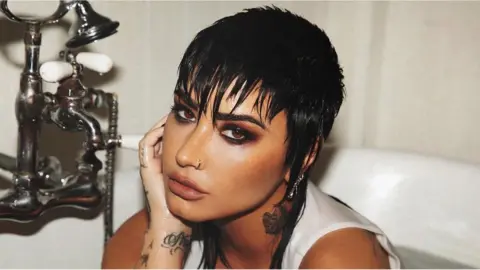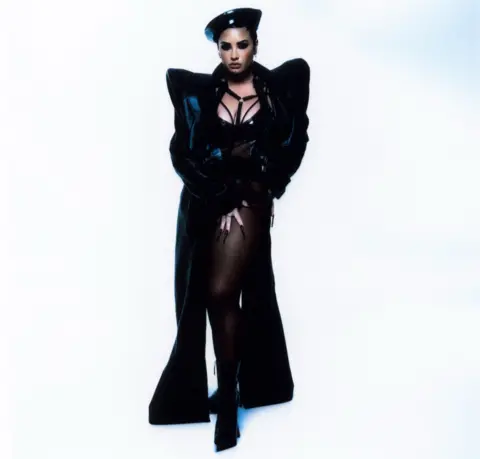Demi Lovato is back, and this time she's angry
 Polydor
PolydorIn 2008, back when she was a fresh-faced Disney star, a reporter asked Demi Lovato about her taste in music.
"What fascinates me," she said, "is metal."
She continued by namechecking hardcore bands Dimmu Borgir and Job For A Cowboy, whose songs were called things like Reduced to Mere Filth and Tormentor of Christian Souls.
Then, the 15-year-old had second thoughts.
"I think [Disney Channel president] Gary Marsh would kill me."
That irreverent candour has always been part of Lovato's appeal. from her days on kids' TV to her platinum-selling music career, via stints on the US X Factor and the sitcom Will & Grace. But she's never fulfilled the promise of a Demi Lovato metal album... until now.
The singer's eighth album, Holy Fvck, is a sonic assault of razor blade guitars and throat-scorching vocals that strips away the radio-friendly veneer of her earlier material.
She signalled the stylistic shift earlier this year, with an Instagram post captioned: "A funeral for my pop music." In the accompanying photo, Lovato raised both middle fingers to the camera, while surrounded by her record label team.
"It wasn't an actual funeral," laughs the star, "but I was in a label meeting and we all happened be wearing black and I was like, 'This is perfect because I'm not playing pop music anymore. This is a rock album.'
"I definitely wanted to go harder with the sound."
Allow Instagram content?
The music's dark hues are matched by Lovato's lyrics, which document the latest twists in her complicated journey through alcohol and drug addiction, mental health issues, treatment and recovery.
She started writing the album after a voluntary stint in rehab last December, which exposed a lot of "unresolved trauma" from her 20 years in the spotlight.
"I had learned to honour my anger rather than shoving it down, which I had been doing for quite some time, and that really showed in the lyrics," she says.
Released on Friday, the album has already given the star career-best reviews, with Clash magazine calling it a "howl of brilliance" and the Independent praising its "extremely horny" hard rock anthems.
The opening track, Freak, addresses the hateful comments Lovato received after coming out as non-binary last year (she initially asked to be referred to as they/them but recently announced she was again accepting she/her pronouns).
Eat Me, meanwhile, is directed at Lovato's old team, who packaged the singer up as a femme fatale and tried to tame her wilder instincts.
"Be more predictable, be less political... Clean and digestible, less of a spectacle," she drawls over a buzzsaw riff, caustically ticking off the advice she received.
"One of the lines is, 'Would you like me better if I was still her?'" says Lovato, "and I'm referring to a period of time in my life where I was this hyper-feminine pop star that everyone else wanted me to be.
"I was on stage in leotards and stilettos, and that's never been comfortable to me. And so Eat Me was definitely a song where I was talking about how I'm tired of spoon feeding myself to the public.
"That song is just basically saying, 'This is who I am, take it or leave it.'"
 Getty Images
Getty ImagesOn 29, Lovato's anger turns towards the much-older partner she became romantically involved with at the age of 18.
"Numbers told you not to," she sings, "but that didn't stop you."
The song appears to be about That '70s Show actor Wilmer Valderrama, who Lovato dated between 2010 and 2016.
In the past, the star has credited him with helping her through her substance abuse problems.
"He's loved me the way I never thought I deserved to be loved," she wrote on Instagram in 2015, "I really wouldn't be alive today without him."
But turning 29 - the age Valderrama was when they started dating - appears to have put a new perspective on the relationship.
"When you're a teenager, you think you know what's best for you," says Lovato. "Even in your 20s you think, 'Oh, I know who I am, I figured it out.' But [this song] was [about] a realisation that I had when I turned 29."
"I just wrote it from a very vulnerable place. It was something that I needed to get off of my chest."
Lovato was careful not to name Valderrama directly in our interview and a representative for the actor declined to comment.
 Getty Images
Getty ImagesIn the meantime, 29 has gone viral on TikTok, with dozens of fans using the audio to soundtrack their own accounts of dating older men.
"This song has me sobbing," wrote one user, who was also in a relationship with a 12-year age gap. "He was a teacher, I was a student," said another, while sharing her story. "I was just 13," added a third, who tagged their post #youthpastor.
The reaction took Lovato by surprise.
"I was definitely very hesitant to release it as a single - but I'm so happy I did, because I've had people hit me up and be like, 'Hey, I'm so glad that you're shining a light on this topic.'
"And so I'm really grateful that people can find a sense of understanding with their pasts and hopefully prevent anybody from getting in the same situation that I was in."
Elsewhere, Lovato's album takes aim at the church, where she felt ostracised for her sexuality; and at the tabloid press, for the salacious way they report on her health issues.
The singer has never been any less than upfront about her personal problems: An eating disorder that started in childhood, harrowing sexual abuse as a teenager, and the subsequent self-harm, depression, and drug and alcohol addictions that culminated in a near-fatal heroin overdose in 2018.
That incident resulted in three strokes, a heart attack and brain damage that left the singer temporarily blind.
It came after a long period of sobriety, during which she felt she was losing her identity.
"I was sober for six years, but I was miserable the whole time," says the singer, who has previously discussed the "controlling" environment around her, with people watching what she ate, even to the extent of checking her Starbucks receipts.
"I once said an interview that every day was a challenge and when I look back at those times, I realised that something wasn't right. And it was because I wasn't doing it for myself.
"Now I am."
 Brandon Bowen
Brandon BowenHer latest stint in rehab came after a realisation that being "California sober" - allowing herself marijuana and alcohol in moderation - wasn't the right approach. As we speak, she's feeling the best she has for years.
"You know that saying that you're never completely free of it [addiction]? It's true, but I don't feel like it.
"I'm in a really good place where, sometimes, I just forget about it."
That liberation is expressed on the second half of the new album, where anger gives way to acceptance and even happiness. Dead Friends is a loving send-off to the people she's lost along the way; 4 Ever 4 Me is a declaration of romantic love; and Heaven is a hymn to sexual liberation.
"I Iove a double meaning," laughs the singer conspiratorially. "When people hear a song called Heaven from Demi Lovato they're going to think, 'Oh, she almost died. It's a song about going to heaven', and actually, it's a song about masturbation.
"I'm a very sexually empowered person," she says. "I have my own line of sex toys so it's not something that I've shied away from.
"So this album, it's kind of like sex, drugs, rock and roll.... without the drugs."
An earlier version of this story suggested that Demi Lovato became romantically involved with Wilmer Valderrama at the age of 17. They did not start dating until she was 18.
